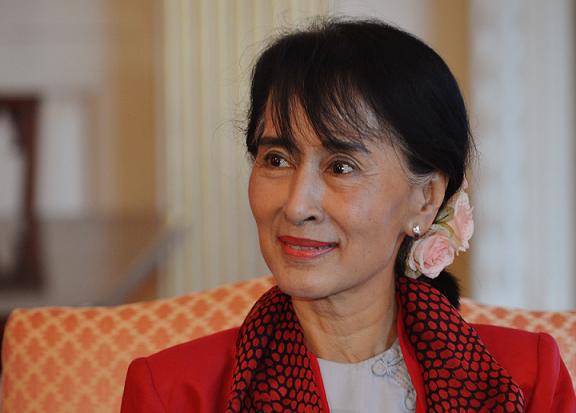
Some superstars take pride in being known by just one name, but Amnesty International USA’s star guest on September 20th goes by five: Daw Aung San Suu Kyi. A town hall event aimed at the next generation of activists had young people on busses at 4 AM to make the trip to Washington, DC. The venue was perfect — the Newseum, a museum dedicated to the First Amendment.
Addressing the Rights Generation, Amnesty’s Frank Jannuzi asked the audience to keep their phones and electronic devices on during the event. Hashtags and suggested messages scrolled on the large screen as students found their networks and tweeted the story. Mid-Atlantic student leader Stephanie Viggiano was on Facebook with a video she created that day with her phone.
Many in the room would have been young children in 1989 when Daw Suu was first arrested. Yet they came out in the hundreds, eager to hear the words that she had for them — the Rights Generation. Daw Suu encouraged them to work not just for prisoners of conscience, but for the root causes of why people are imprisoned. Her adherence to a policy of nonviolence was apparent in response to a question about the Arab Spring. She argued that the means cannot be divorced from the ends and human rights are incompatible with violence. Instead, she said that change can only come about through endurance.
Her peaceful resolve is awe-inspiring. She never despaired her many years of house arrest. She saw this as a path she chose. Her thoughts were with those who were in prison, knowing how bad their conditions were. She has no animosity towards her captors — because of her father’s status as the founder of the modern military in Myanmar, she quipped that she was treated as a member of the family, albeit the “troublesome child.” To get her through this period of “endurance,” she read. She said she loves to read, and one of her messages to the Rights Generation was to read — and not just the Internet, she said, but real books.
Despite the positive news of the release of Daw Suu and other prisoners of conscience, Myanmar still has a long road ahead for human rights for all. While Amnesty International USA takes no position on sanctions, the United States and the European Union greet Myanmar’s move toward democracy with an end to sanctions.
With so much focus on the change, we ask, what is the current state of human rights in Myanmar?
- Although authorities recently decided to release hundreds of prisoners, including prisoners of conscience, Amnesty International believes others may be imprisoned without record. Many of the prisoners of conscience remain in the rural and border areas. Furthermore, the released prisoners can be re-imprisoned without a warrant under the Code of Criminal Procedure if authorities feel they have not fulfilled the conditions of their release. In past and recent amnesties, the government released some prisoners on condition that they do not engage in political activities.
- Over 800,000 ethnic Rohingya people are stateless in Myanmar. The government denies them citizenship and protection. President Thein Sein says they “illegally entered” Myanmar and are “not our ethnicity”. The government will put the Rohingya, a Muslim minority, in UN detention camps. They face severe and ongoing persecution. Amnesty International recently reported a government sweep of Rohingya areas resulted in the arrest of hundreds of men and boys without charges. Their whereabouts are still unknown. Other reports of state perpetrated violence include the beating of Rohingya children by security forces and the failure to intervene in attacks on Rohingya and other Muslim communities. At least 78 have been killed since the violence started.
- In other areas, conflict persists despite official ceasefires. In the past year an estimated 60,000 people in Kachin state were displaced by violence. Reports of rape, torture, and extrajudicial killings persist. Furthermore, the use of child soldiers continues in many border areas.
To coincide with Daw Suu’s visit, Amnesty International released a document and action aimed at the US businesses that will be moving into Myanmar as the government lifts sanctions.
Claudia Vandermade, Amnesty International USA Southeast Asia Coordinator, contributed to this post.
